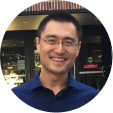
This is an interview with Lukas Toma, founder and CEO of Knoyd and a data science mentor with Springboard, on his education in data science, career path, and how the responsibilities of data scientists have evolved.
How did you begin your data science education?
For my bachelor’s degree, I did math, and for me, that was a no-brainer because I was a nerd in high school. But I didn’t want to do pure math because it didn’t seem fun, so I did financial and insurance math. Turns out that wasn’t too much fun either – it was a lot of theory and not much application. I ended up doing my bachelor’s thesis with a professor who was the only one of our professors who had worked in industry before – he had worked as a risk officer at a bank, and he taught a data mining class at my university. So that’s how most of the people in my class got into artificial intelligence and machine learning.
When did you start learning programming languages?
My bachelor’s was very paper-based. I started coding during my master’s. There was a point where I was behind everyone who came from outside of Eastern Europe, and I had a bit of catching up to do. But it paid off. I had no choice because you can’t do data science on paper.

What strategy for learning new coding languages was most successful for you?
The first language is always the most difficult, and I think that goes for human language as well. One piece of advice I have if you’re new to coding is – Google things a lot. Don’t try to figure it out yourself. And the second one is, put the hours in. Find a problem that is interesting for you and actually write code, and write a lot of it. The more you write the faster you will learn. There is a very direct correlation there.
Tell me about your master’s study in Data Mining and Knowledge Management.
As i was leaving University there wasn’t really a place to study machine learning, so I started looking around and I ended up in France. My master’s degree was a bit of everything. There was everything from symbolic learning to numerical methods to data mining to business applications. It was great because in France they don’t make you do a lot of theoretical work, but instead, they have industry placement where you have to find a position at a company or research center and work there for half a year, and then you complete your master’s thesis based on that work.
Get To Know Other Data Science Students
Lou Zhang
Data Scientist at MachineMetrics
Ginny Zhu
Data Science Intern at Novartis
Peter Liu
Business Intelligence Analyst at Indeed
During your master’s program you worked on a research project, Neurokiff. Could you explain what your group did there?
The idea behind Neurokiff was born from a US company that started manufacturing a portable electroencephalogram (EEG) device for about $100 bucks. You can pop the EEG on someone’s head and measure brain stimuli in real time. The vision was that you could run experiments where you show people pictures or music, stimulate their senses, and you can measure their reactions. Because you can measure the waves, you can actually quantify reactions much better than if you had a focus group or collected data using methods from the social sciences. We started with music – we had a partnership with a company that sells concert tickets. The vision behind the partnership was to find what kind of music people liked, identify opinion makers on social networks, perform tests on those people, and take the results to recommend music to people in their communities. Now, Neurokiff is mainly focused on sensory reactions to food and wine. It is definitely a very cool project, very outside of the box.
What was your first job as a data scientist?
I had to find a job after school for my master’s thesis. I didn’t really want to work for a big company, so I started sending my CV everywhere in Europe because I had visa issues when it came to getting to the United States. I joined Kreditech (a German credit company) when there were 40 people working there, so it was still a startup at that stage. When I left after 2 years there were 300 of us. I went from a data science intern to heading my own department and touching on a bunch of different projects. I stayed until the point where I felt kind of stuck because there were two data science, guys, before me, and there was nowhere else to go. So that’s when I decided to try something else. I met a buddy of mine from my bachelors in Czech Republic, and we decided to launch Knoyd.
Can you tell me more about what your team does at Knoyd?
When we started Knoyd, the idea was that we wanted to touch as many different projects in as many different fields as possible, in a short time. And we figured the best way to do this is to help people who are dealing with a data-related problem but can’t solve it themselves. What we specialize in is helping companies that don’t have any data scientists in house. They have data – sometimes they have an idea of what to do with it, sometimes they don’t, and we basically help them with inspiration all the way to designing and implementing their first working solution. We also try to help them find a data scientist, one who will actually be their employee and move them forward. The idea is that if we hit gold, we can stick with it and go in a particular direction, but our main objective is learning.
How have you seen the data science industry change over the past 5-10 years?
I think two things have happened in the last couple of years. One is that a data scientist is no longer required to be the unicorn – you no longer need to know everything. There is a split between the hardcore-modeling guys, data engineers, visualization guys, and the presentation guys – which I think is awesome because it allows you to be better at focusing on what you do best within data science.
The second way I think data science has changed a lot is that there is now a big split between the particular fields where it is important to use precise algorithms to solve a very particular problem – and the fields where a 5% increase in precision isn’t as important, and where the main goal is to make the model as simple as possible. I think this is very interesting because it wasn’t always this way. It destroys the idea of evaluating your model based on a metric.

You’ve been a data science mentor with Springboard for 8 months now. What standout projects have you seen from your students?
One of my mentees, Nina did her capstone project on building a recommender system based on the medical effects of marijuana in the United States. In the first week she pointed out that, although marijuana is legal in many states for medical purposes, not many people care about the specific strains you use to treat a particular condition.
She found there are a bunch of resources to monitor different strains of marijuana – ideal growing conditions, medical effects, bad side effects, taste, things like that. She put it together to make a pretty cool recommender system you can use either for medical purposes – put in your medical condition and it can recommend based on your location and condition a strain which would be good for you; or for non medical purposes – put in a strain and it will give you similar recommendations.
Any interesting problems that you are currently working on?
I think there are fascinating data science problems everywhere, you just have to keep your eyes open. We just went out today with a blog post on analytics and Pokémon Go. It turns out you can optimize your portfolio of Pokemon in a way so you don’t have to catch them all, but only just a couple to beat others.
It depends on how dedicated you are to doing data science, and how much time you want to spend on it. I think the problems are infinite.

Lukas is a mentor at Springboard for the Foundations of Data Science and Data Science Intensive workshops, enroll now and learn from a data science mentor like Lukas.
Since you’re here…Are you interested in this career track? Investigate with our free guide to what a data professional actually does. When you’re ready to build a CV that will make hiring managers melt, join our Data Science Bootcamp which will help you land a job or your tuition back!





